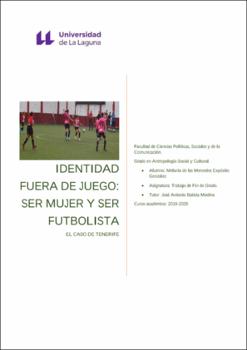Identidad fuera de juego: ser mujer y ser futbolista. El caso de Tenerife.
Fecha
2020Resumen
El fútbol femenino en España está viviendo una década de gran evolución, teniendo cada vez más peso en nuestra sociedad y haciéndose hueco en las retransmisiones deportivas. Esto es resultado de una lucha que las mujeres de este deporte llevan manteniendo décadas. A nivel nacional se puede valorar el camino recorrido desde los años 70 hasta la actualidad. Cada vez se cosechan más éxitos, y se vislumbra un futuro muy prometedor. En este trabajo se profundiza sobre su impacto en la sociedad, su crecimiento y los reconocimientos obtenidos hasta ahora, centrándose en concreto en la isla de Tenerife, y comparándolo con la situación general del país. Una de las herramientas fundamentales para llevar a cabo esta investigación ha sido la auto-etnografía, lo que ayuda a ver el trabajo desde las dos perspectivas, emic y etic. Women’s soccer in Spain is living a decade of great evolution, winning more and more importance in our society and getting their correspondent place in the sports retransmissions. This is the result of a struggle carried by women soccer players for decades. Nationally we can value the progress that has been made since the 1980s until the present. Women’s soccer is getting more triumphs, and it looks like the future will be full of success as well. In this work we deepen on its impact in society, its growth, and the obtained recognitions, focusing on the island of Tenerife, and comparing it with the general situation of the country. One of the essential tools needed in order to do this investigation was the autoethnography, which helps us to see the work from two different perspectives, emic and etic.





